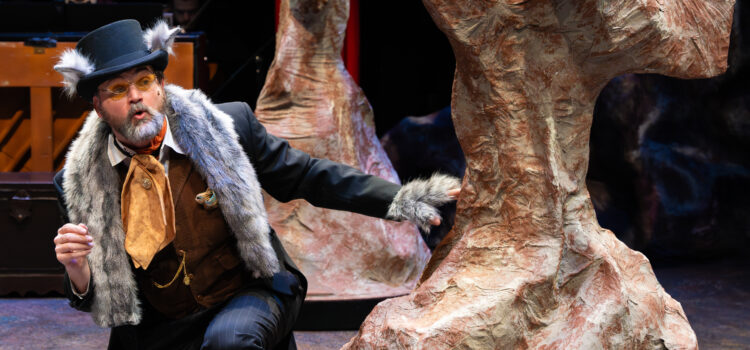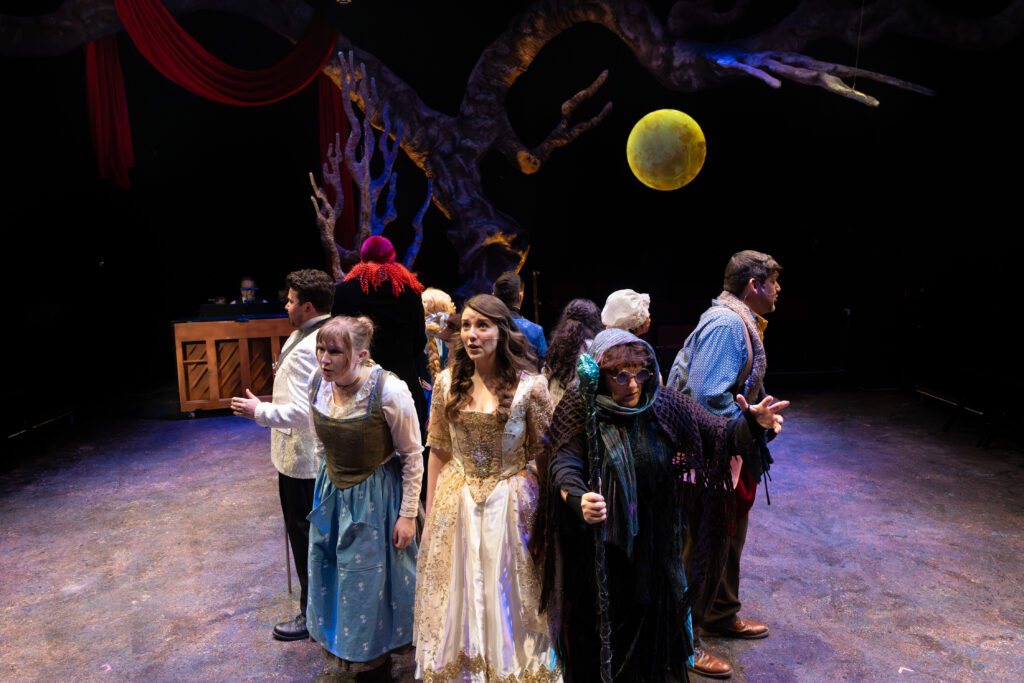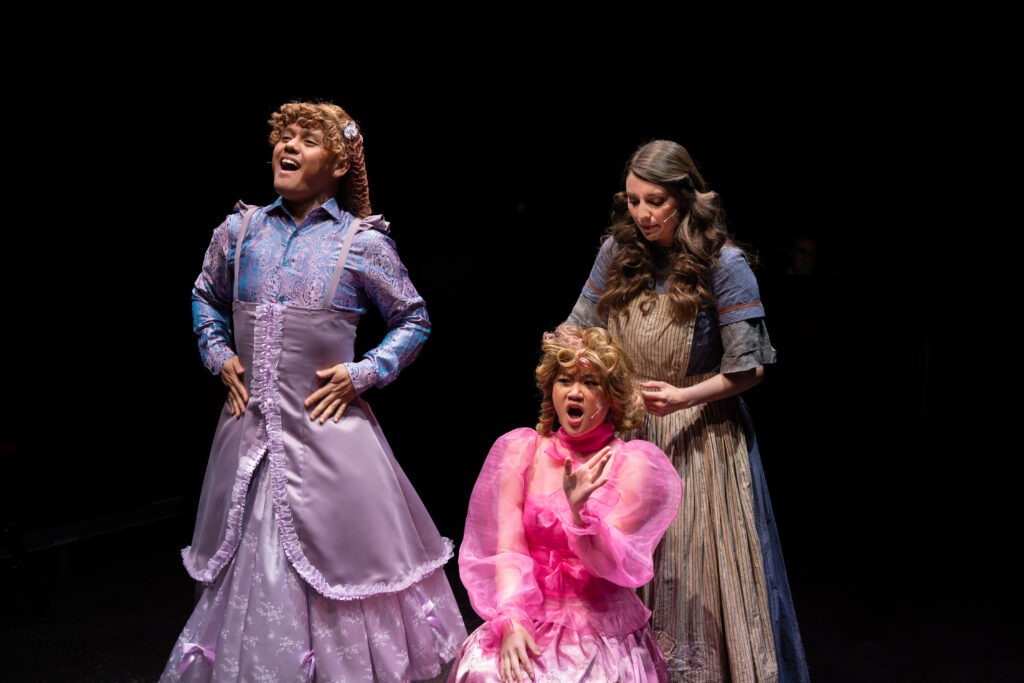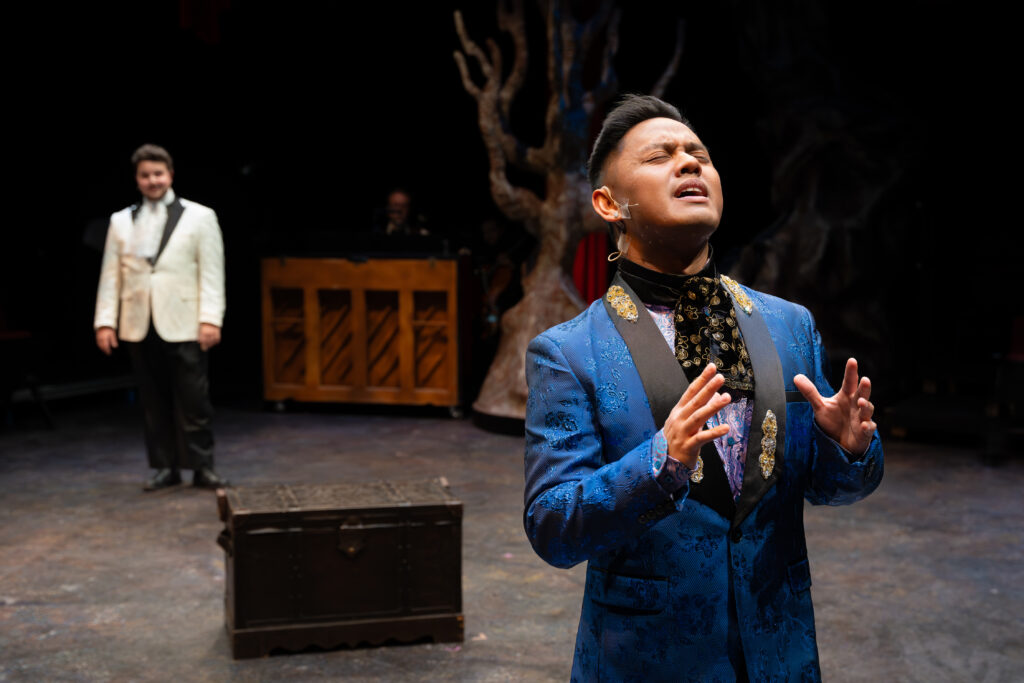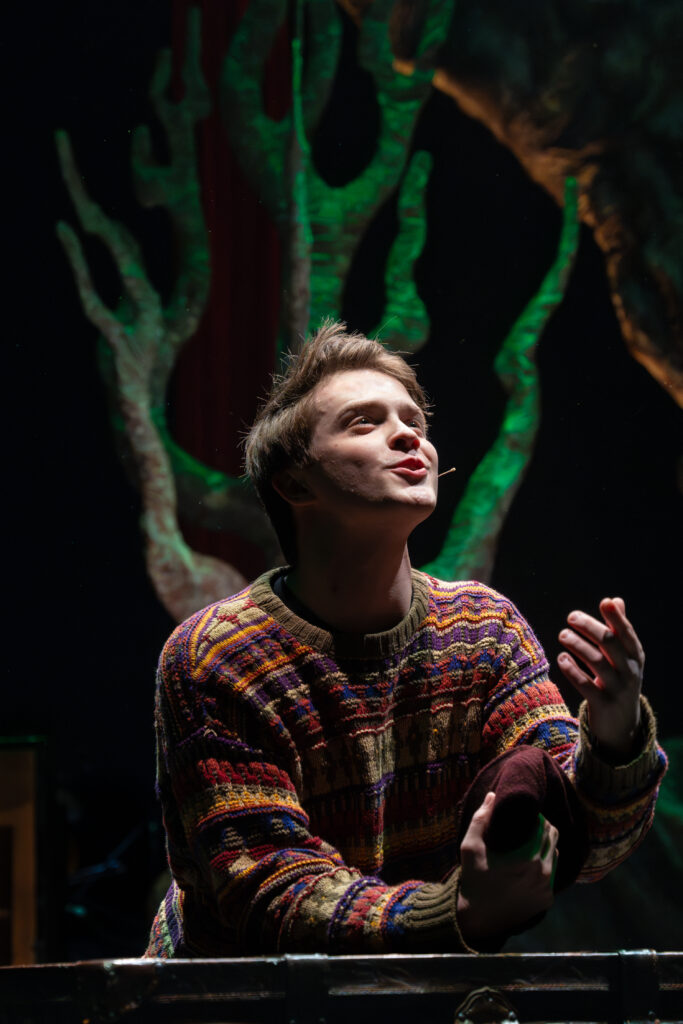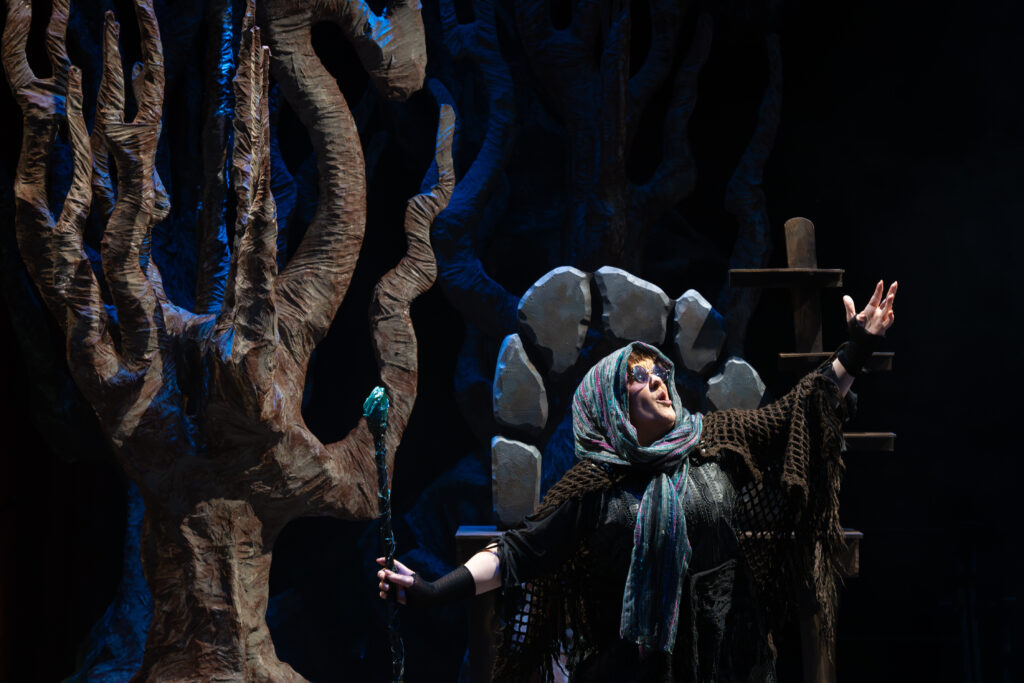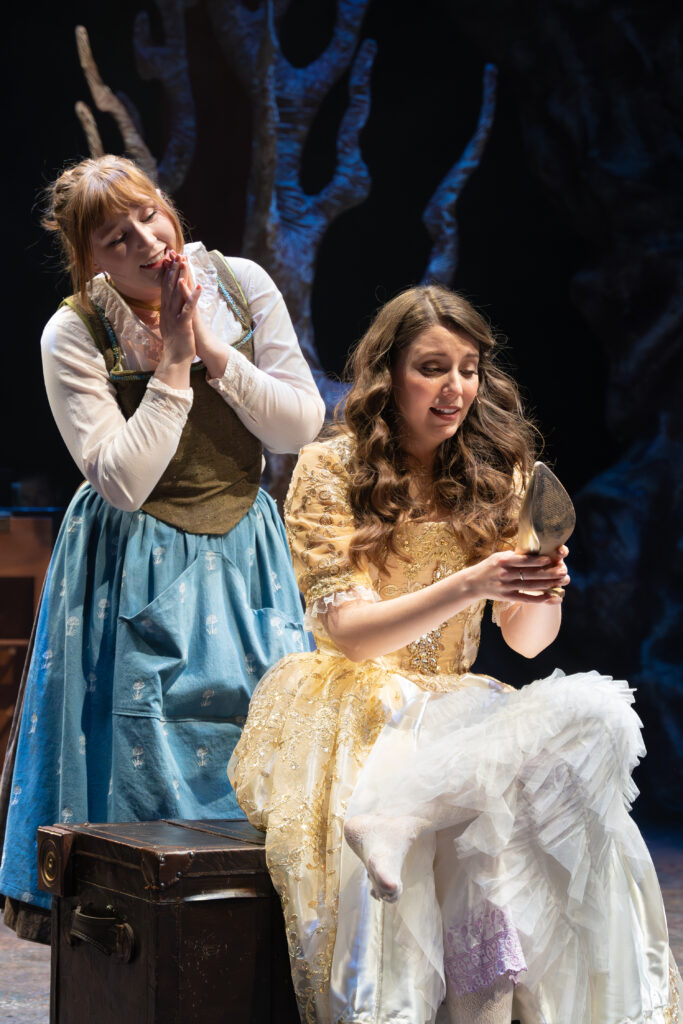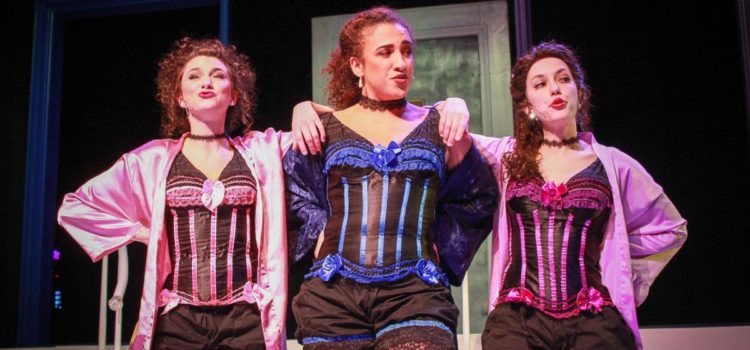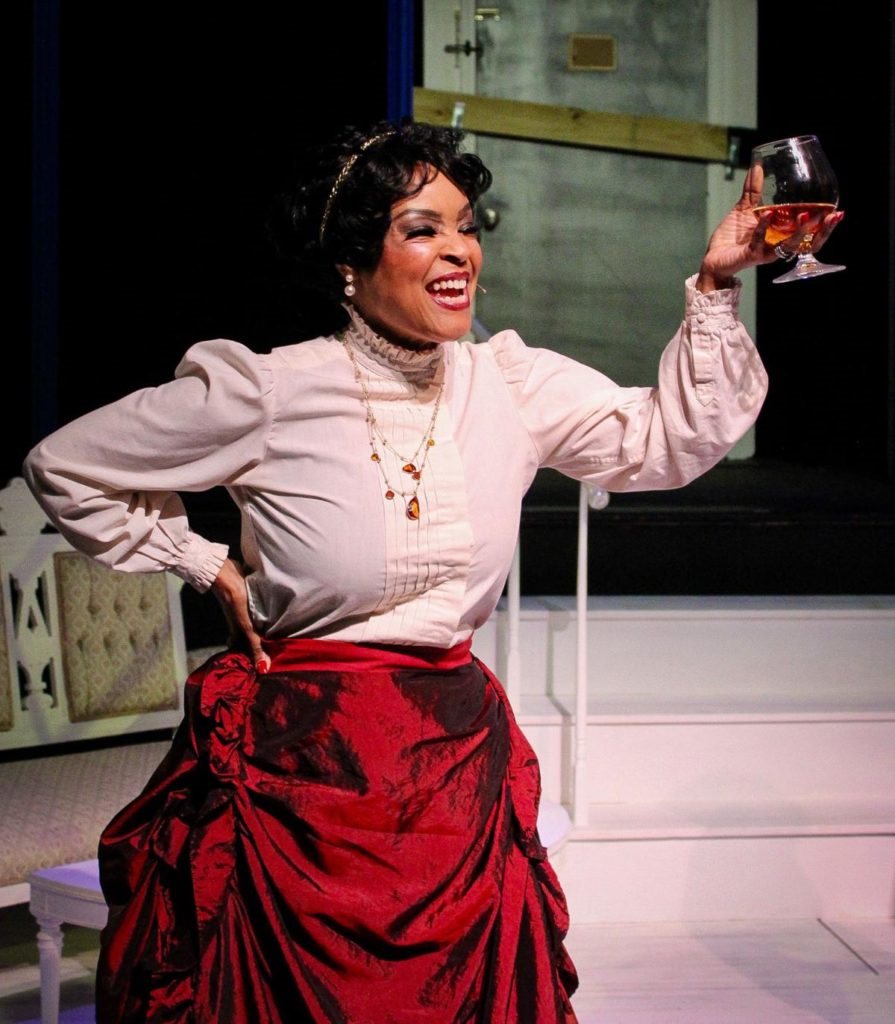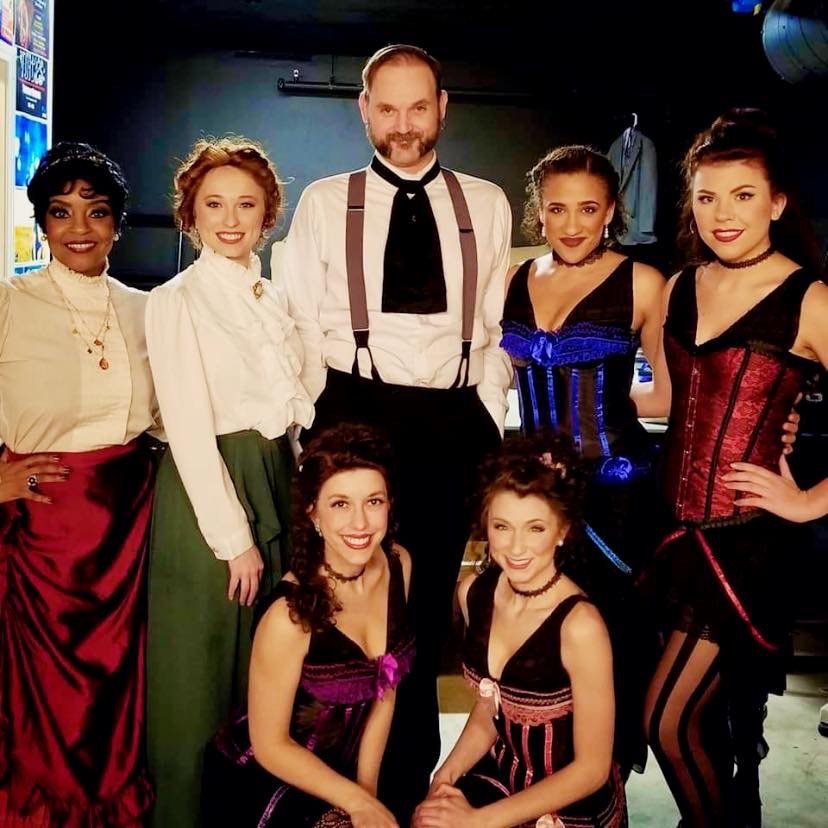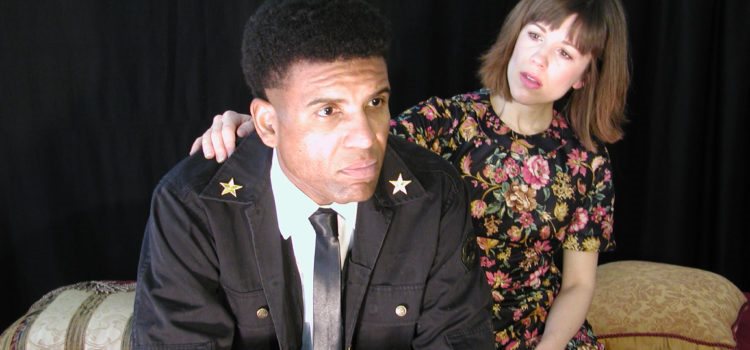By Lynn Venhaus
“Xanadu” is a silly bunch of nonsense – and that is its intention. A spoof of the ridiculous 1980 romantic musical fantasy movie must be playful, and Stray Dog Theatre leans into the stage musical comedy sendup with full-bodied camp.
The theater company’s affinity for broad comedy romps is well-known, and they’ve presented these types of crowd-pleasers for years, from “Evil Dead: The Musical” and “Triassic Parq” to Charles Busch’s oeuvre “Red Scare at Sunset,” “Vampire Lesbians of Sodom” and “Psycho Beach Party,” among them.
And they gleefully double-down on this show’s cheesiness. Director Justin Been takes great delight in skewering the movie’s premise as a turgid soap opera that’s part “Saturday Night Live” sketch (think of the deliberate exaggerated acting in “The Californians”) and part old-timey Hollywood studio system dream factory, sprinkled with fairy dust.
To fully understand the surprising transformation from movie to Broadway, here’s a little backstory. Somehow, after the film was totally trashed upon its release, it developed a cult audience, and then in 2007, a stage adaptation was Tony-nominated for Best Musical. Stranger things.
The comical book was written by Douglas Carter Beane, who won a Drama Desk Award for it and is known for his musical adaptations of “Cinderella” and “Sister Act.” He wrote the 1995 movie “To Wong Foo, Thanks for Everything! Julie Newmar.” Stray Dog Theatre produced his Tony-nominated play, “The Little Dog Laughed,” in 2014.
Being familiar with the movie “Xanadu” is not a prerequisite to enjoy this farcical show, but it helps if you have some knowledge of ancient Greek mythology, for Beane incorporates the shlocky epic “Clash of the Titans” into his themes, including the Immortals.

The wackadoodle screenplay by Richard Danus and Marc Rubel was already inspired by the 1947 Rita Hayworth movie “Down to Earth,” which features muses showing up to teach Earthlings a lesson. Fun fact: Xanadu is the exotic name of Mongolian emperor Kublai Khan’s summer palace.
This far-fetched plot doesn’t take itself seriously – or shouldn’t. Set in Los Angeles, the 44-year-old movie focused on a beautiful muse (pop star Olivia Newton-John riding the ‘Grease’ wave) who inspires a young hunky artist (Michael Beck, fresh from “The Warriors”) and his older friend (Gene Kelly! Yes, the ‘Singin’ in the Rain’ icon) to convert a dilapidated auditorium into a hip roller-skating club, all set to the beat of Yacht Rock songs.
She is forbidden to fall in love with a mortal, but two mean-spirited sisters (Calliope and Melpomene) concoct a curse, and chaos ensues. Is it surprising that it was nominated for six Razzie Awards?
At the first Golden Raspberry Awards in 1981, the movie lost the worst picture award to another truly awful musical, “Can’t Stop the Music,” which was a pseudo-autobiography of the Village People and starred then-Bruce Jenner (now Kaitlyn), Oscar nominee Valerie Perrine and Steve Guttenberg (Gotta love the ‘80s!). But the “Xanadu” director Robert Greenwald did take a Razzie home.
See if this makes any kind of sense: Artist Sonny Malone – Phil Leveling having a blast doing ‘beach’ dressed like Malibu Ken and talking like a righteous dude – has completed a mural at Venice Beach that he’s not satisfied with, so he wants to end it all.
He has a chance encounter with Clio, a muse masquerading as a fetching Aussie named Kira who roller skates and wears leg warmers. She sprang eternally from the Mount Olympus artwork, and her effect has made him change his mind. She is played with a wink and a smile by Shannon Lampkin Campbell.
They pair well on their duets “Suddenly” and “Suspended in Time.”
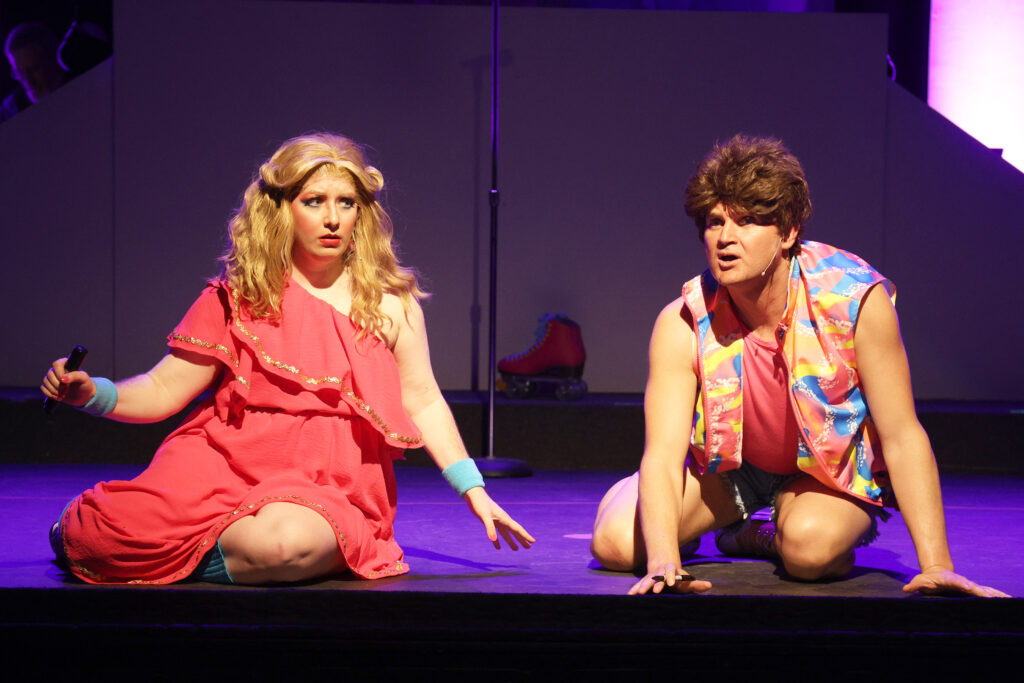
However, she didn’t arrive alone. Because Sonny envisioned the Immortals, her six sisters (Zeus’ daughters) magically appear, cavorting in their goddess cosplay – two are guys in drag.
Eight are part of the ensemble in multiple roles: Mateo Bluemel, Sarah Gene Dowling, Lindsey Grojean, Chelsie Johnston, Madison Mesiti, Drew Mizell, Katie Orr, and Lauren Tenenbaum.
Dowling, as Calliope, and Johnston, as Melpomene, inject much humor in “Evil Woman” and “Strange Magic,” two of Electric Light Orchestra’s power-pop songs added to the stage musical.
Sonny’s new dream is to turn an old theater into a roller disco. He tries to convince a wealthy real estate magnet Danny McGuire, a former Big Band musician, to give him the property, and eventually they become partners. But the road to success is rocky.
Kira’s presence re-awakens part of Danny’s past where he had a memorable fling with a look-alike named Kitty. This is all played for laughs, as well it should. That leads to a snazzy ‘40s-style song-and-dance because Gene Kelly played the film role, so of course (“When You’re Away from Me”).
Scott Degitz-Fries, a lithe dancer whose smooth moves on local stages are always admirable, is effortless in these dancing sequences. He has mad roller-skating skills and is a former competitive figure skater (made it to the national finals in high school), so he also served as roller-skating consultant.
Everyone else is trying very hard, and skills vary, but you can’t knock people doing their best given such a demanding challenge.

Choreographer Mike Hodges worked the moves out with Degitz-Fries, and he created the bouncy musical group numbers so that it accurately resembles late ‘70s, early ‘80s dance-floor action: “I’m Alive,” “Magic,” and “All Over the World,” with a grand “Xanadu” are bright spots.
A mash-up scene that attempts to duplicate the movie’s “Battle of the Bands” between The Tubes, which was a rock band then (you may recall their 1983 “She’s a Beauty”), and an Andrews Sisters type girl-group circa World War II. Called “Dancin’,” it is a tad messy, and the ill-fitting costumes hamper the girl duo in their movements because of the clingy fabric. Cute little hats, nevertheless.
Costume designer Colleen Michelson’s dresses are mostly distracting and unflattering. Overall, the muses’ cheap-looking chiffon outfits don’t seem suitable, with tacky designs and shoddy material – unless it’s done on purpose? Are they meant to be versions of flimsy Johnny Brock Halloween costumes for quirky ‘80s looks? Costumers must adhere to budgets, but to me, the styles are a disconnect for the female characters. Now the Mount Olympus white gowns are fine, and the guys’ attire is, too.
Music director Leah Schultz and her zesty band keep the beat peppy – Adam Rugo on guitar, Randon Lane on second keyboard, and Joe Winters on percussion. They have added some amusing riffs, too.
Leveling is strong leading the power ballad “Don’t Walk Away” that ends Act I on a good note, while the finale “Xanadu” gets the crowd on their feet.
Campbell set the right tone for Newton-John’s signature 1975 hit “Have You Never Been Mellow” that was added to the stage musical and winds up a memorable ensemble piece.

ELO’s Jeff Lynne is credited with music numbers, as is John Farrar, Newton-John’s longtime producer. Their work propelled the soundtrack to skyrocketing sales that ended that year with twice-platinum numbers.
Director Been also simply constructed the set so that movement could flow on the small stage, and it was illuminated well by lighting designer Tyler Duenow.
Because of its lightweight goofy premise that can only be stretched so far, one’s relieved when the wrap-up comes around 2 hours (with an intermission). Pacing is uneven at times, and the show can get a little shaggy. The meaning of this falderal? “Xanadu” is “true love and the ability to create and share art.”
The film came out at a time when everyone had been trying to duplicate the magic of “Saturday Night Fever” and disco, so hot for a brief time, was waning. And the stage musical came out at a time that jukebox musicals were emerging as a trend, such as “Mamma Mia!” and the retro “Hairspray.” Ah, that elusive “Next Big Thing.”
This production of “Xanadu” is well-meaning fluff, with entertaining tongue-in-cheek performances, so don’t expect more – just go with the good vibes coming from kitschy pop culture.
“Xanadu” is going to hit people differently, depending on when and how this tale came into their lives – whether they were young listening to the soundtrack on their Walkman, or today, enjoying a sentimental walk down memory lane.

Stray Dog Theatre presents “Xanadu” from April 4 to April 27, Thursdays through Saturdays at 8 p.m., with Sunday matinees at 2 p.m. April 14 and April 21 at the Tower Grove Abbey, 2348 Tennessee Ave, St. Louis, MO 63104/ For tickets or more information, visit www.straydogtheatre.org

Lynn (Zipfel) Venhaus has had a continuous byline in St. Louis metro region publications since 1978. She writes features and news for Belleville News-Democrat and contributes to St. Louis magazine and other publications.
She is a Rotten Tomatoes-approved film critic, currently reviews films for Webster-Kirkwood Times and KTRS Radio, covers entertainment for PopLifeSTL.com and co-hosts podcast PopLifeSTL.com…Presents.
She is a member of Critics Choice Association, where she serves on the women’s and marketing committees; Alliance of Women Film Journalists; and on the board of the St. Louis Film Critics Association. She is a founding and board member of the St. Louis Theater Circle.
She is retired from teaching journalism/media as an adjunct college instructor.


